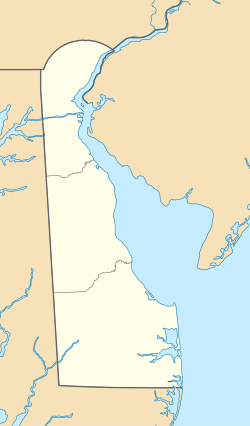Seaford, Delaware
| Seaford, Delaware | |
|---|---|
| City | |

High Street in Seaford
|
|
| Etymology: Seaford, East Sussex in England | |
| Nickname(s): Youth Sports Capital (official), Nylon Capital of the World (historical) | |
 Location in Sussex County and the state of Delaware. |
|
| Location within the state of Delaware | |
| Coordinates: 38°38′28″N 75°36′40″W / 38.64111°N 75.61111°WCoordinates: 38°38′28″N 75°36′40″W / 38.64111°N 75.61111°W | |
| Country | United States |
| State | Delaware |
| County | Sussex |
| Incorporated | April 6, 1865 |
| Government | |
| • Mayor | David Genshaw |
| Area | |
| • Total | 3.5 sq mi (9 km2) |
| • Land | 3.46 sq mi (9.0 km2) |
| • Water | 0.04 sq mi (0.1 km2) |
| Elevation | 23 ft (7 m) |
| Population (2010) | |
| • Total | 6,928 |
| • Density | 2,002.3/sq mi (773.1/km2) |
| Time zone | Eastern (EST) (UTC-5) |
| • Summer (DST) | EDT (UTC-4) |
| ZIP code | 19973 |
| Area code(s) | 302 |
| GNIS feature ID | 214626 |
| Website | www.seafordde.com |
Seaford is a city located along the Nanticoke River in Sussex County, Delaware. According to the 2010 Census Bureau figures, the population of the city is 6,928, an increase of 3.4% from the 2000 census. It is part of the Salisbury, Maryland-Delaware Metropolitan Statistical Area.
It is the largest city fully within Sussex County and was voted the 28th Best Small Town in America. It hosted the Seaford Eagles of the Eastern Shore Baseball League.
Seaford is named after Seaford, East Sussex in England.
All land in current western and southern Sussex County was first settled as part of Maryland. Seaford, along with Bridgeville, Greenwood, Middleford, and others, were all part of Dorchester County in the Province of Maryland. Blades, Laurel, and Concord areas, on the other hand, were part of Somerset County. It is reported that an error in a map coordinate resulted in the east-west line of Delaware being from current Delmar to Fenwick. The original agreement had the eastwest line at the Cape Henlopen, not at the false cape. If the line had survived, Seaford would now be in Maryland. After many years in the courts of London, the boundary lines are as the surveyors Mason and Dixon defined in 1763.
Only 20 acres (81,000 m2) of land remain from the plantations original size of 1,400 acres (5.7 km2). There are many notable buildings on this property, you can find a granary, stable, smokehouse, corn cribs, and Delaware's only documented surviving slave quarters.
Seaford is one of seven Main Street communities that participated in the Delaware Main Street Program, part of the national Main Street plan to revitalize commercial districts. The program was developed in the 1970s by the National Trust Main Street Center, which was in turn a program of the National Trust for Historic Preservation. In 1999–2000 Seaford's historic downtown area along High Street underwent major renovations, preserving the city's old fashioned charm with $1.5 million of landscaping, street paving, sidewalks, lamp posts, street lights, and utility upgrades.
The Building at 200-202A High Street, Building at 218 High Street, Building at High and Cannon Streets, Burton Hardware Store, J. W. Cox Dry Goods Store, First National Bank of Seaford, Hearn and Rawlins Mill, Lawrence, Maston House, Jesse Robinson House, Edgar and Rachel Ross House, Gov. William H. Ross House, St. Luke's Protestant Episcopal Church, Seaford Station Complex, and Sussex National Bank of Seaford are listed on the National Register of Historic Places.
...
Wikipedia


